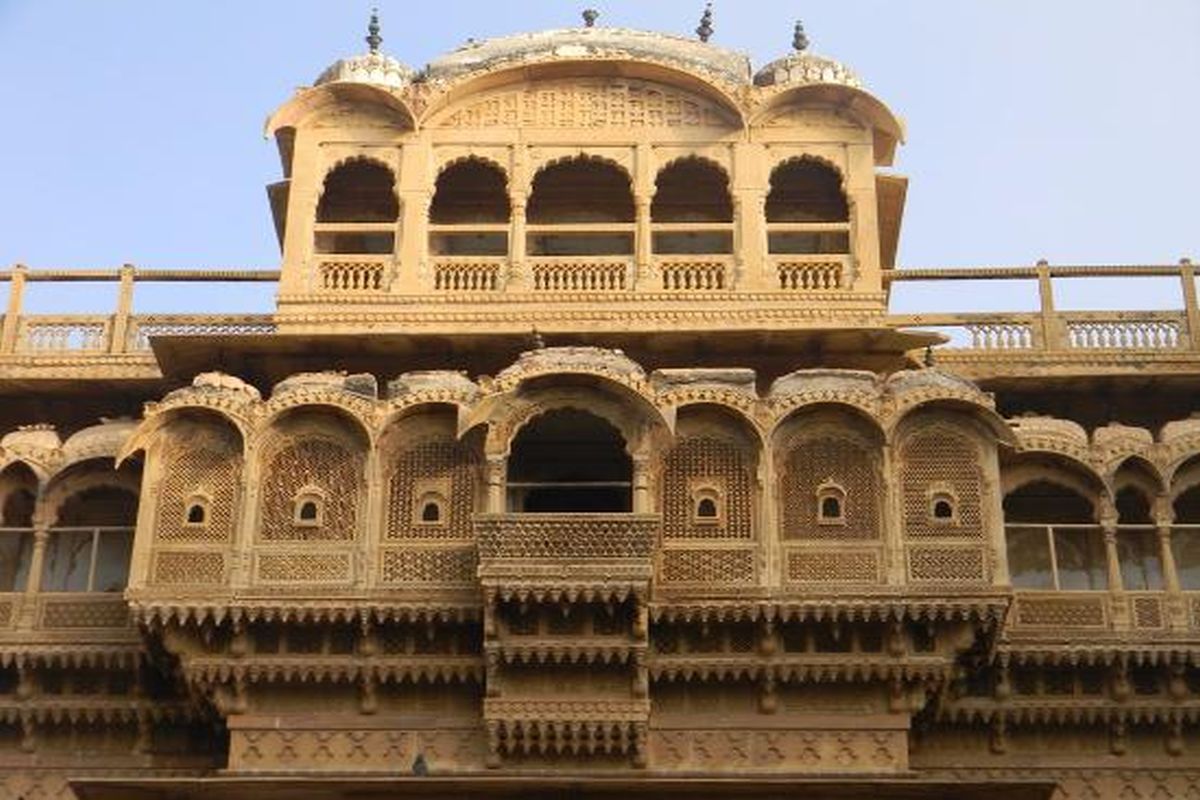Every time one peeped out from the train’s window, the only view one could enjoy was a vast spread of barren land, without any sign of habitation. There was nothing to see other than a few keekar trees or a few houses. And this sight dominated throughout the journey from New Delhi to Jaisalmer. This is how Rajasthan, a land of royals, forts and culture but full of barren lands and sand, welcomed us. This is the character of the Rajasthan that makes this western state of India unique. However, our appetite for scenic views continued until we reached our beautiful destination —Jaisalmer, the last city in western India.
Once the train chugged into the platform by afternoon, it was just a riot of golden hues everywhere. Be it the latest hotels, buildings or any monument, all are made of yellow sandstone. And during sundown, the city shines like gold. Indeed, this is the reason why it has earned the title of Golden City. Another impressive part of the city is its structure — be it hotels, homes or havelis, all are designed artistically, giving them a look of fort or palaces.
Advertisement
Our tryst with Jaisalmer began from the hotel itself. The newly-built property, Sairafort Sarovar Portico, located just five minutes away from the railway station, wears the look of some fascinating golden palace. One can get mesmerised by its architecture and detailing in each and every part of the hotel. From the façade to the interior, from the restaurant to the lobby, everything was wonderfully done. Trust me, the property will impress the moment one steps into it. In terms of amenities, the hotel is made of stone and consists of 53 aesthetically-decorated rooms and six lavish suites. The best part of the hotel is its window bed — from there one can see the mighty Jaisalmer fort. We checked into the beautiful property in the afternoon, which meant we had still some time in hand to explore the city. What could be better than experiencing sunset? Our quest for this took us to a small hilly point, from where one could have a bird’s-eye view of the whole city.
It was simply a visual treat to see the sun descend behind the golden fort. As sunset approached, the small area began getting crowded with people. Jaisalmer is known to offer architecture treasures to tourists. Therefore, it is mandatory to visit havelis and forts. But before that one must also know about its history. The city is 800 years old and was founded in 1156 by Bhati Rajput ruler Rawal Jaisal. The city was untouched by many due to its harsh climate and remote location but it had another advantage. It was an important stop in the trade route between Egypt, Afghanistan and India. Because of its favourable location, the ruler would charge some tax from the passersby and this led Jaisalmer’s rulers and traders to become quite rich. Perhaps this was the reason, the city has built such sumptuous palaces, temples and havelis. The first stop had to be the famous Jaisalmer Fort, built by Rajput ruler Rawal Jaisal in 1156. It is the only fort in the world where people still live. Located on Trikuta Hill, the massive yellow sandstone walls make it the Golden Fort. Inside the fort, one can find palaces, houses and temples, all built with soft yellow sandstone.
Among them, one should not miss the Taj Mahal, The Jain and the Laxmikanth Temples. Patwon-ki-Haveli is another most fetching touristic destination in the city. It is a cluster of five small havelis, owned by a merchant named Patwa in the past. Located in the narrow lanes, this is the largest haveli in Jaisalmer. One can enjoy exquisite workmanship on the gateways and arches. Another famous haveli is Nathmal-ki-Haveli. This was the residence of Diwan Mohata Nathmal, then Prime Minister of Jaisalmer. Then one could also visit Salim Singh-ki-Haveli, whose roof was constructed in the form of a peacock. One must visit also Gadsisar Sagar Lake, which has artistically carved ghats and temples. A lake in the desert! In the evening, one must go for a desert safari in Sam Sand dunes, which is 45 km away from the city. There one could spend time camel riding, playing in the sand or taking as many selfies as one wants. At night one must enjoy the local musical programme, which almost every hotel organises for their guests.











